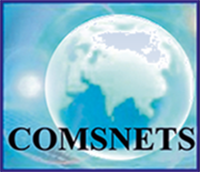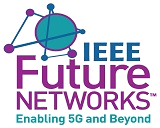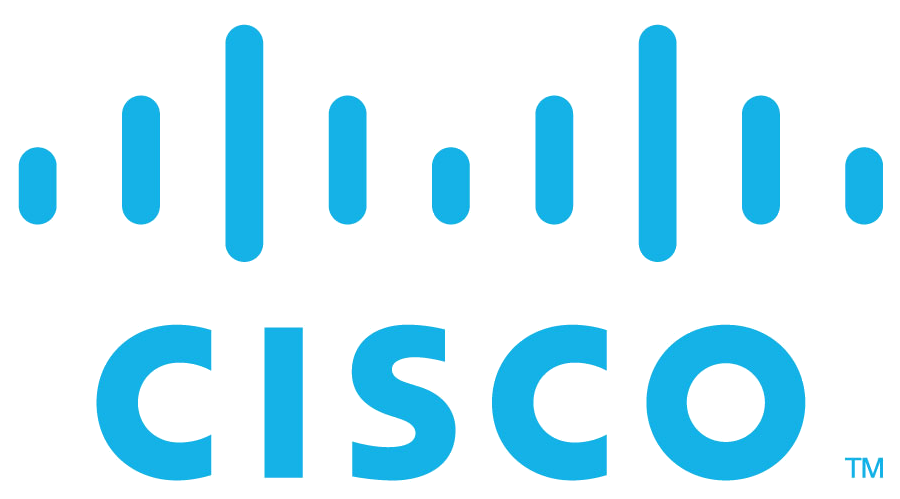Accepted Posters
COMSNETS 2021 Poster decisions are out!
Kindly note that at least one full registration for all COMSNETS 2021 posters is mandatory. At least one author per accepted paper (Main conference, Poster, Workshops, Demo) must register at the full rate, i.e., at Regular IEEE/ACM member rate, or at non-member rate. In the case of an accepted paper with exclusively student authors (i.e., all authors are full-time students and no other co-authors), registration at the student rate is permissible. This is as per the guidelines of IEEE and ACM. It is mandatory to register for the paper before uploading the camera ready to EDAS. There will be no exceptions to this policy.
Camera ready papers are due by Dec 15, 2020 (HARD DEADLINE). Please adhere to the instructions given on the website in preparing the camera ready manuscript.
- Need for TVWS Availability Quantification After the Analogue TV Switch-Off
Steven Wandale (Yokohama National University, Japan); Gracian Taulo (University of Malawi, Malawi); Thesaurus Nammelo (University of Malawi, Japan); Dereck Kondwani and Patrick Musiyapo (Malawi Communication Regulatory Authority, Malawi); Chomora Mikeka (University of Malawi & E-Communications Research Group (eCRG) Consulting, Malawi) - Performance Analysis of Power Series based MIMO/FSO Link with Pointing Errors and Atmospheric Turbulence
Anand Kumar (University of Vit, India); Sangeetha R G (Vellore Institute of Technology, Chennai, India) - Differential d-vectors for RSS based Localization in Dynamic IoT Networks
Piyush Tiwary, Ankur Pandey and Sudhir Kumar (Indian Institute of Technology Patna, India) - Monte Carlo Rollout Policy for Recommendation Systems with Dynamic User Behavior
Rahul Meshram (University of Waterloo, Canada); Kesav Kaza (Indian Institute of Technology Bombay, Mumbai, India) - Cost Effective Influence Maximisation
Somyadeep Shrivastava and Dheeraj Chaudhary (Indian Institute of Information Technology Dharwad, India); Yayati Gupta (École Centrale School of Engineering, Mahindra University Hyderabad, India); Sanatan Sukhija (É́cole Centrale School of Engineering, Mahindra University, India) - An Adaptive and Dynamic Allocation of Delay-sensitive Vehicular Services in Federated Cloud
Moustafa Najm (Indian Institute of Technology Guwahati, India); Moumita Patra (IIT Guwahati, India); Venkatesh Tamarapalli (Indian Institute of Technology Guwahati, India) - Angle and Height Estimation Technique for Aerial Vehicles using mmWave FMCW Radar
Prabhat Kumar Rai and Abhinav Kumar (Indian Institute of Technology Hyderabad, India); Mohammed Zafar Ali Khan (Indian Institute of Technology, Hyderabad, India); Soumya J (BITS Pilani, Hyderabad Campus, India); Linga Reddy Cenkeramaddi (University of Agder, Norway) - Object Classification Technique for mmWave FMCW Radars using Range-FFT Features
Jyoti Bhatia, Aveen Dayal and Ajit Jha (University of Agder, Norway); Santosh Kumar Vishvakarma (IIT, Indore, India); Soumya J (BITS Pilani, Hyderabad Campus, India); M Srinivas (BITS Hyderabad, India); Phaneendra Yalavarthy (Indian Institute of Science, India); Abhinav Kumar (Indian Institute of Technology Hyderabad, India); V. Lalitha (IIIT Hyderabad, India); Sagar Koorapati (Nuvia, USA); Linga Reddy Cenkeramaddi (University of Agder, Norway) - Robust Paths in Random Geometric Graphs with Applications to Mobile Networks
Ghurumuruhan Ganesan (Indian Statistical Institute, New Delhi, India) - MatchCloud:Service Matching for Multi Cloud Marketplace
Arpana Chakma (NITK Surathkal, India); Shubham Kumar (Silicon Institute Of Technology, Sambalpur, India); Pradeep Kumar Mahato (Silicon Institute of Technology, Sambalpur, India); Anurag Satpathy (National Institute of Technology, Rourkela, India); Sourav Kanti Addya (National Institute of Technology Karnataka, India) - Monitoring COVID Hotspots Using Telecom Data: Voronoi Tessellations for Marking Buffer Zones
Anupam Singh (IIT Bombay, India); Manjesh K Hanawal (Indian Institute of Technology Bombay, India) - A Spatio-Temporal Coded Modulation Scheme for Molecular MIMO Systems
Muskan Ahuja (IIT Campus, Hauz Khas, India); Manav Bhatnagar (Indian Institute of Technology Delhi, India) - Link Adaptation for Multi-connectivity Enabled 5G URLLC: Challenges and Solutions
Jihas Khan and Lillykutty Jacob (National Institute of Technology Calicut, India) - Repair Pipelining for Clay-Coded Storage
Krishna Rajendram Bashyam (India) - Secure Raptor Encoder and Decoder for Low Storage Blockchain
Aayush Tiwari (International Institute of Information Technology, Hyderabad, India); V. Lalitha (IIIT Hyderabad, India) - Challenges in Net Neutrality Violation Detection: A Case Study of Wehe Tool
Vinod S Khandkar and Manjesh K Hanawal (Indian Institute of Technology Bombay, India) - securePrune:Secure block pruning in UTXO based blockchains using Accumulators
Swaroopa Reddy (IIT Hyderabad, India) - Exploiting Space and Antenna Diversity for Wideband Spectrum Sensing
Kamal Manharlal Captain (Sardar Vallabhbhai National Institute of Technology, India); Manjunath V. Joshi (DA-IICT, India) - A lightweight machine learning based security framework for detecting phishing attacks
Yogendra Kumar and Basant Subba (National Institute of Technology Hamirpur, India) - Anomaly Score: A new Feature for Effective Prediction of Events in Social Networks
B S.A.S Rajita (Birla Institute of Technology & Science, Pilani - Hyderabad, India); Venkata Rajeswara Aditya Kota, Kaushik Perika and Subhrakanta Panda (BITS-Pilani, Hyderabad Campus, India) - Inter-AP Communication Protocol based Frequency Assignment in IEEE 802.11 WLAN
Babul P. Tewari (Indian Institute of Information Technology, Bhagalpur, India); Sasthi C. Ghosh (Indian Statistical Institute, India) - A Scalable Block-Proportional Fair Scheduling Scheme For Multi-Carrier Transmission Systems
K. Bharati (IIT Madras & Chennai, India); Maheswaran Palani (National Institute of Technology, Thiruchirappalli, India) - Performance of MRC and ZF Receivers in IQ-Impaired Uplink Massive MIMO Systems
Rachit Mahendra and Saif Khan Mohammed (Indian Institute of Technology Delhi, India); Ranjan K. Mallik (Indian Institute of Technology - Delhi, India) - Computational Complexity Analysis of Block Ciphers of Transport Layer Security
Nisarg Joshi and Raghav Raghuwanshi (NITK, Surathkal, India); B. R. Chandavarkar (National Institute of Technology Karnataka Surathkal India, India) - Distributed Spectrum Sensing for Cognitive Vehicular Networks using Quasi-Newton Optimization
Sagar Kavaiya (School of Engineering and Applied Science, Ahmedabad University, India); Dhaval Karshanbhai Patel (School of Engineering and Applied Science-Ahmedabad University, India); Yong Liang Guan (Nanyang Technological University, Singapore); Sumei Sun (Institute for Infocomm Research, Singapore); Yoong Choon Chang (Universiti Tunku Abdul Rahman, Malaysia); Joanne Mun Yee Lim (School of Engineering, Monash University Malaysia, Malaysia) - A Vehicle-Aided Data Collection Scheme for Wireless Rechargeable Sensor Networks
Rohit Kumar and Joy Chandra Mukherjee (Indian Institute of Technology Bhubaneswar, India) - Minimizing Interference in an Aged Massive MIMO System
Vikas Arya (Indian Institute of Technology BOMBAY, India); Ramesh Muravath (Qualcomm India pvt Ltd, India); Shubham Kshiteesh Mishra (QUALCOMM INDIA PVT LTD, India); Anil Allada (Qualcomm India Private Limited, India) - Protecting Intelligent Route Control Against Spurious Timeouts
Alexandre Fonte (Polytechnic Institute of Castelo Branco, Portugal) - Efficient Elevator Mode Protocol to Recover Active calls from Transient Network Outages
Prasad Basavaraj Dandra (Samsung Semiconductor & International Institute of Information Technology Bangalore, India); Ajaykumar Kabadi, Srinivas Chinthalapudi and Raju Siddappa (Samsung Semiconductors, India); Debabrata Das (International Institute of Information Technology - Bangalore, India) - Inference of Control Structures in Adaptive Networked Systems
Kaliappa Ravindran (City University of New York, USA); Arun Adiththan (General Motors, USA); Michael Iannelli (City University of New York (CUNY - City Colllege), USA) - Fine-grained Data Deduplication and proof of storage Scheme in Public Cloud Storage
Hardik Gajera (DA-IICT, India); Manik Lal Das (DAIICT, India) - LSTM Autoencoder aided Estimation of Primary Activity Statistics under Imperfect Sensing
Bhargav P Patel (School of Engineering and Applied Science, Ahmedabad University, India); Dhaval Karshanbhai Patel (School of Engineering and Applied Science-Ahmedabad University, India); Brijesh Soni (School of Engineering and Applied Science, Ahmedabad University, India); Miguel López-Benítez (University of Liverpool, United Kingdom (Great Britain)); Sagar Kavaiya (School of Engineering and Applied Science, Ahmedabad University, India)








































